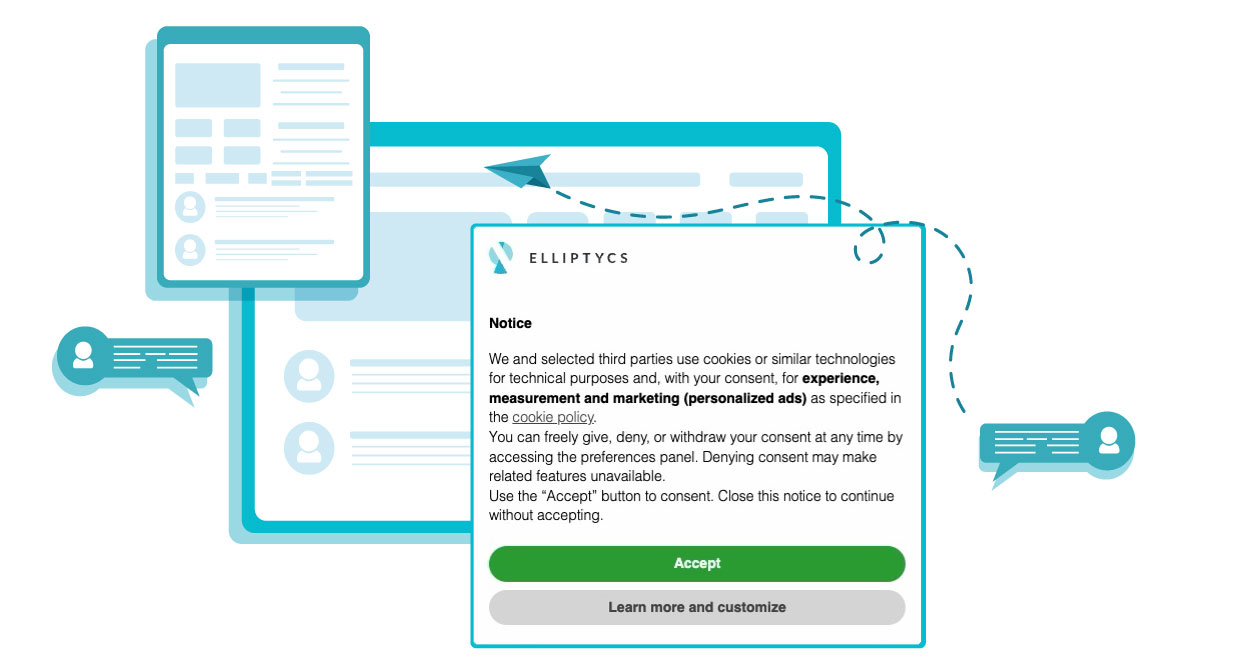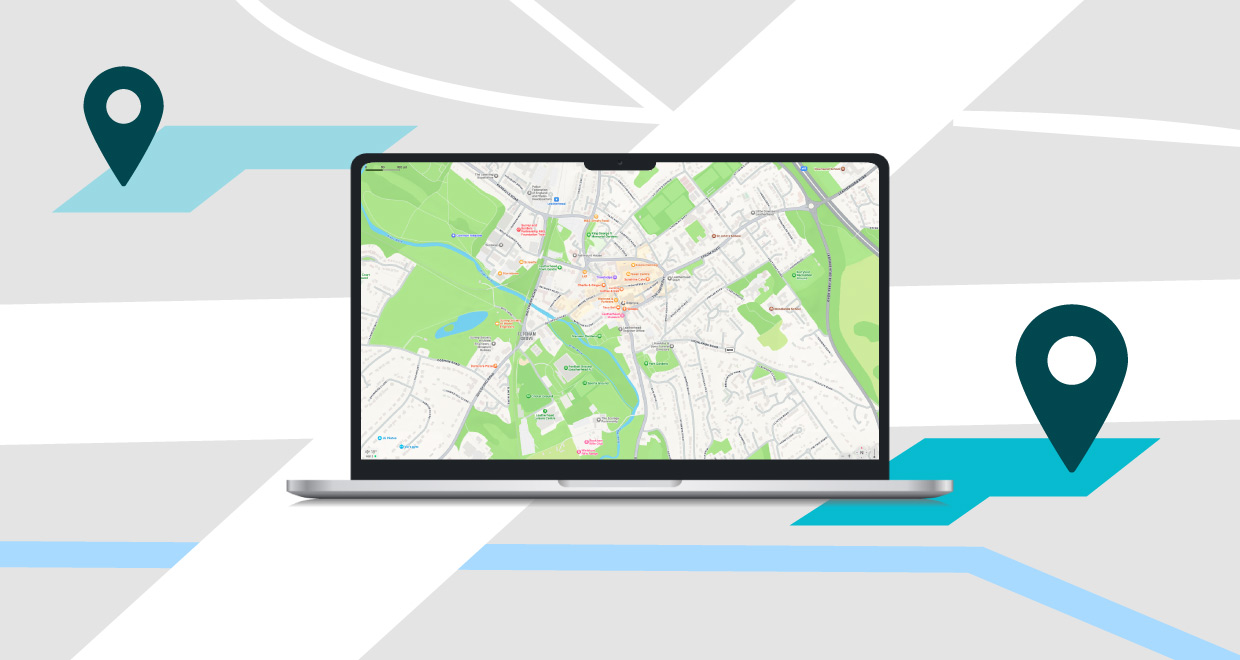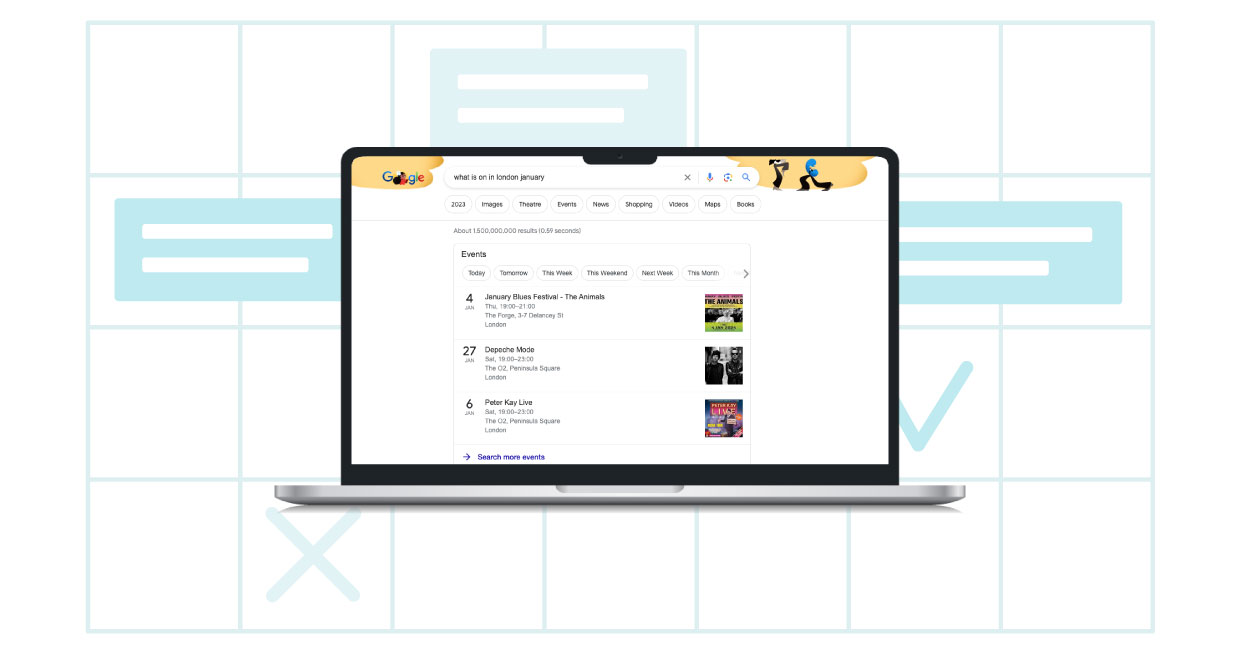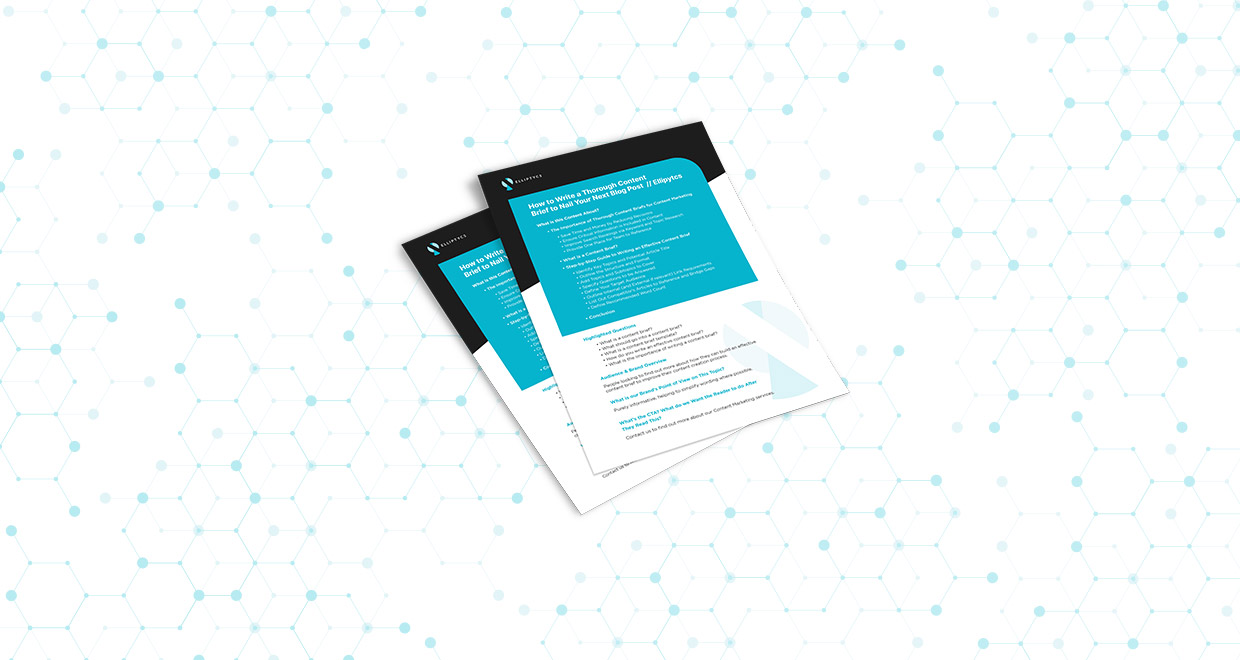Local sponsorship marketing is a simple yet effective way for your business to connect with the local community. It is a strategy that is often overlooked, but can yield significant benefits.
This article will guide you through what local sponsorship marketing involves and how it can help your business grow. We cover the practical benefits and how to identify and approach potential sponsorship opportunities.
What is Local Sponsorship Marketing?
Local sponsorship marketing is a straightforward strategy for businesses to gain visibility while supporting their community. It typically involves a partnership where a business agrees to sponsor a local club, charity, event, or initiative for a set amount in exchange for brand exposure. As an alternative to financial sponsorship, a business may choose to offer their services and expertise.
For example, sponsoring a local sports team is a classic form of local sponsorship marketing. Your business name and logo might appear on the team’s kits, promotional materials such as social media posts, websites, emails, brochures, programmes, or signage around their venues.
Benefits of Local Sponsorship Marketing for Your Business
As a business, engaging in local sponsorship marketing offers a multitude of advantages:
Corporate Social Responsibility
Supporting local charities and clubs underlines your commitment to contributing to society and local initiatives. Engaging in CSR initiatives like local sponsorships will not only enhance your company’s image but can also lift employee morale, as staff take pride in being part of a company that actively supports the local community.
Enhanced brand visibility
Increased brand visibility is a significant benefit of local sponsorship. When you sponsor a local club or charity, your brand name and logo will likely gain exposure on various platforms, from social media and websites to team kits, increasing recognition and resonating authentically with the local audience.
Networking opportunities
Local sponsorship marketing opens doors to new business relationships that can be invaluable. You’ll connect with other businesses, potential clients, and community leaders. These local connections often lead to long-term business relationships and opportunities.
Differentiation
Supporting local causes will set you apart from competitors. It demonstrates your business’ ethos and aligns your brand with community values, creating your own identity in the market. Customers are more likely to support a community-oriented business, so you can be the business they turn to.
How do I find local sponsorships?
You now understand the benefits of local sponsorship, and you may be curious about how to find sponsorship opportunities. It is not a complex process, and can be enjoyable when you know where and how to look.
Involving employees in the search can also make the process much more fun. Encourage your team to contribute their suggestions and input, as they might have personal connections or insights that could give you more options. This also facilitates a sense of collaboration and gives everyone an opportunity to participate in the community initiative.
Use Online Tools to Research Local Organisations
Leverage online search engines like Google to help with your search. We like to incorporate simple Google search operators; for instance, the “OR” operator is used to search pages that might include at least one of the terms you’re querying. You can use this when you’re searching for different items; for example, if you are searching for a club, charity, or an event in Leatherhead, you can use:
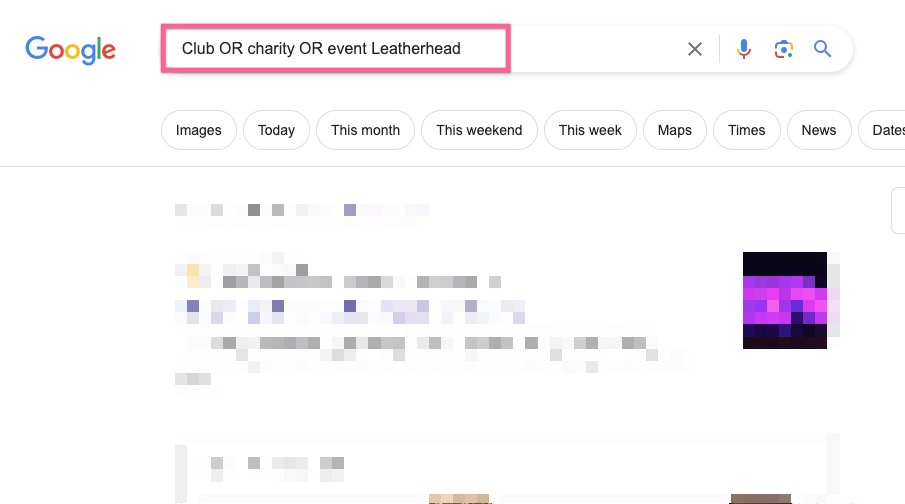
Google will then look for pages that contain any of these combinations. Using operators can expose you to better-quality results.
Identify Opportunities
Once you have identified any sports clubs, events, or charities in your area, compile a list of opportunities. We like to add these to an Excel spreadsheet, as this allows us to list the pros and cons of each opportunity side by side, enabling a clear comparison. Take some time to visit their websites, sponsors page, and social media profiles.
Look for clubs or charities that make a positive impact and whose values resonate with your business’s core values. For instance, if your business is family-oriented, you might look to find local children’s sports leagues. Remember, charitable organisations and local sports teams are always looking for support.
Evaluating Sponsorship Opportunities
Before reaching out to potential sponsorship opportunities, it’s important to consider how that partnership would align with your business’s objectives.
Additionally, ensuring a meaningful return on investment (ROI) and a positive impact on your reputation is crucial. Here’s how we like to navigate these considerations:
Ethical Compatibility
Start by assessing the ethical values of the organisation you’re considering sponsoring. Ensure their principles and practices align with your business’ values to maintain brand integrity and avoid potential scrutiny.
Assess Potential ROI
Assessing the potential return on investment is about understanding the visibility and exposure opportunities the sponsorship offers. For us, a key aspect of this evaluation is looking into the organisation’s engagement and activity levels on their social media platforms. Active social channels with high engagement rates are a good indicator of their ability to give you good exposure.
It is also worth looking into their audience demographics to ensure you can gain visibility to your target customer base – the more aligned their audience to your target market, the more likely your sponsorship will generate interest and lead to positive results for your business.
If you are looking to get a link on their website, make sure to review if they have a “sponsors” page or section. This will also help reveal the type of businesses that currently align with them and provides insight into how your brand will be presented. Equally important is to note if the opportunity already features sponsors in your industry, as this may raise competition and lower your potential return.
When reviewing their website, especially if they provide links to their sponsor’s websites, remember to check for ‘nofollow’ attributes. A ‘nofollow’ link is a tag added to the HTML code of a hyperlink that tells search engines not to pass on site ranking credit to the linked website.
The presence of a ‘nofollow’ link isn’t inherently negative; however, if SEO benefits are part of your sponsorship goals, this is something you should check. You can then add whether they offer a ‘nofollow’ link to your Excel spreadsheet when evaluating your sponsorship opportunities.
To check if the link is a ‘nofollow’ link, right-click on the webpage, select ‘inspect’, and then look into the HTML code. If you see ‘nofollow’ within the tag, this is a ‘nofollow ‘link.
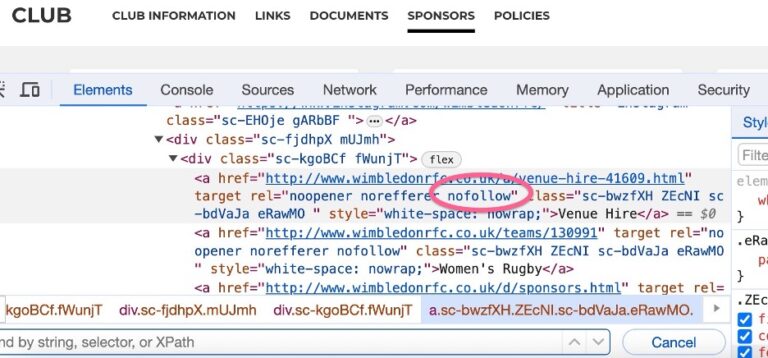
All this data helps you decide whether the sponsorship will drive enough interest towards your business to justify sponsorship investment.
Reach out to Sponsorship Opportunities
Once you’ve evaluated the potential return on investment for your business, the next step is to reach out to your chosen organisations. You usually find the necessary contact details on their website.
A face-to-face meeting allows for a discussion about the partnership, where you can directly ask questions, clarify details about the sponsorship, and get a feel for their enthusiasm for your involvement. Should you sense a lack of eagerness for the partnership, take this as a reflection of how they will value your business’s involvement.
An initial meeting is also your chance to understand what they offer in terms of sponsorship packages and pricing, helping you decide if there is a good fit between your business objectives and their sponsorship opportunities.
Track Results of Your Sponsorship
Tracking the return from your sponsorship investment can be tricky, but not impossible. You ideally want to see a measurable uplift that will help you make decisions for future marketing investments. There are a few steps to take when measuring the success of your partnership:
Check the Quality of Coverage
Ideally, you should monitor the quality of coverage throughout the sponsorship period. You should check their social media posts and mentions of your brand on their platforms. Are they adhering to the agreed posting schedule? Is your logo visible? Is your brand being represented in alignment with your business values?
Moreover, if you receive a website link, it is essential to check that this has been correctly displayed, ensuring it links to your site and functions properly.
Evaluate Website Traffic
Use tools like Google Analytics to track visits to your website that can be attributed to the sponsorship. Look for increased traffic and potential conversions during and after the period to evaluate if you have received a meaningful return on your sponsorship investment.
How to Get Sponsorship from Local Businesses
If you are on the receiving end of sponsorship efforts as a charity or club seeking support, you may be wondering how to engage local businesses effectively for sponsorships.
As a business that has reviewed several clubs and charities for sponsorship, there are some key factors we look out for. It is about presenting a compelling case that aligns with a business’s interests and creating a relationship that offers value to your organisation and the business. Read on for our top tips.
Research Local Businesses
Initiate your sponsorship journey by researching local businesses that align with your charity or club’s mission and values. Identify potential sponsors who have a history of community involvement and might be interested in the social impact your club or charity is creating.
"We research local businesses through local directories and click through to their websites to see if they are a good fit. Although it is difficult to get a reflection of their values from their website, this happens when you have a meeting"
David Pope, Chairman of Leatherhead Football Club
Well-presented Sponsors Page and Social Media Engagement
Ensure you have a dedicated sponsor’s page that is visually appealing and well-maintained. This page should showcase your sponsors effectively. Ideally, each sponsor should have a small description detailing what they do and a little about their business with a link to their website. This will make your club or charity far more appealing to potential sponsors looking for exposure online.
Here is an example of a good sponsors page:
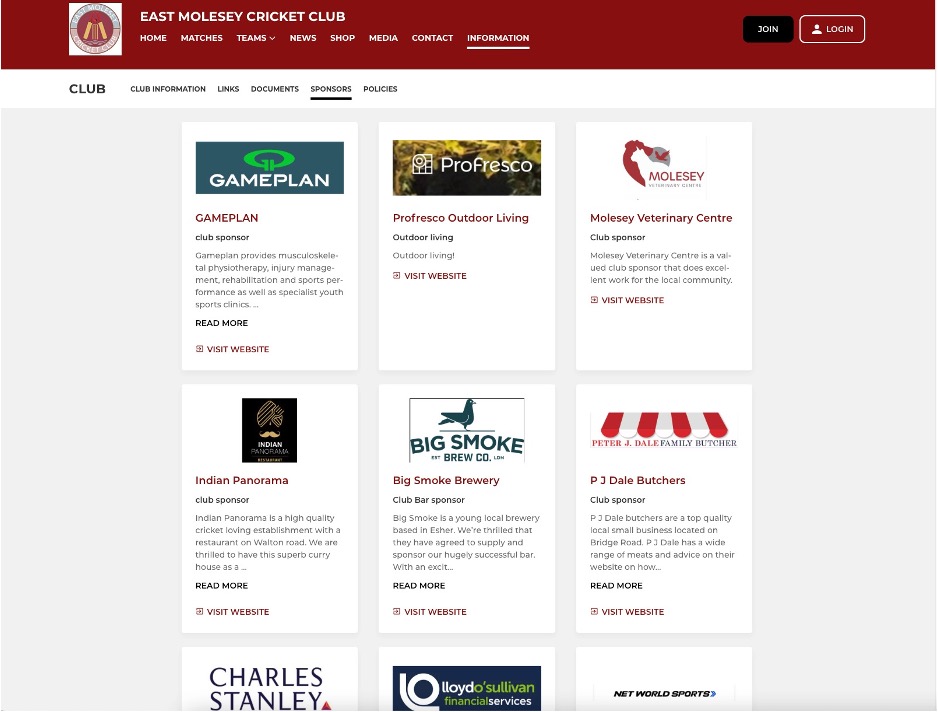
Image from East Molesey Cricket club
Additionally, make it easy for potential sponsors to contact you. Ensure contact details are easily accessible and people know who to reach out to. It can be confusing for businesses when there is no specific sponsorship contact, so make sure to point out who handles these enquiries. This facilitates easy and effective communication.
In addition, active engagement on social media is important. For example, you could welcome your new sponsors on your social media and show your gratitude for their support.
Develop a Compelling Proposal
Craft a proposal that articulates the benefits a business can gain from supporting your charity. Your sponsorship proposal is the first point of contact with potential sponsors and should, therefore, be persuasive, informative, and tailored to their interests.
This should detail how their sponsorship will make a difference, the kind of exposure they can expect, and any additional opportunities it can provide. Highlight how you will feature sponsors on your digital platforms and how you can offer them valuable exposure. A strategy that speaks directly to the interests of businesses is far more likely to captivate them for sponsorships.
"We review what we're offering and ask ourselves, how can we offer value? We've got a story to tell which resonates with local businesses. We get infront of individuals and tailor to their interests."
David Pope, Chairman of Leatherhead Football Club
It is also beneficial to provide some data to evidence your pitch, which can be based on previous success stories. Demonstrate how previous sponsorships have increased brand recognition or community impact, as this can showcase the mutual benefits of the partnership and, therefore, provide a good argument for why a business should support your organisation.
Conclusion
Integrating local sponsorship into your marketing efforts can be a wise choice for any business looking to increase brand awareness, boost community engagement and potentially yield a positive return. Similarly, clubs or charities seeking support can naturally benefit from forming partnerships with local businesses, creating a mutually advantageous relationship.
With our comprehensive article, you now have the knowledge to identify sponsorship opportunities that align with your business values and goals. If you need help navigating local SEO or harnessing the full potential of sponsorship marketing, please do not hesitate to get in touch.

